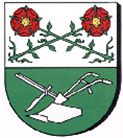Moritz (Zerbst): Difference between revisions
Jump to navigation
Jump to search
Knorrepoes (talk | contribs) m (Text replacement - "/Arms of " to "/Arms (crest) of ") |
Knorrepoes (talk | contribs) m (Text replacement - "{{media}}" to " {{de1}} {{media1}}") |
||
| Line 25: | Line 25: | ||
The arms show in the upper part two roses, taken from the arms of the Lords of Morditz (later Moritz), who had their estate in the village in the 13th and 14th century. The plough already appeard on the local seals in the 19th century and refer to the agricultural character of the village. | The arms show in the upper part two roses, taken from the arms of the Lords of Morditz (later Moritz), who had their estate in the village in the 13th and 14th century. The plough already appeard on the local seals in the 19th century and refer to the agricultural character of the village. | ||
{{ | |||
{{de1}} | |||
{{media1}} | |||
[[Civic Heraldry Literature - Germany|'''Literature''']]: Image from Wikipedia | [[Civic Heraldry Literature - Germany|'''Literature''']]: Image from Wikipedia | ||
Revision as of 10:53, 26 December 2022
This page is part of the German heraldry portal |
Heraldry of the World |
|
German heraldry:
|
Selected collector's items from Germany:
|
MORITZ
State : Sachsen-Anhalt
District (Kreis) : Anhalt-Bitterfeld (until 2007 Anhalt-Zerbst)
Verwaltungsgemeinschaft : Verwaltungsgemeinschaft Elbe-Ehle-Nuthe
Incorporated into : 2010 Zerbst
| German | Geteilt von Silber und Grün; oben zwei stilisierte rote Rosen mit goldener Samenkapsel und spitzen grünen Kelchblättern an sich kreuzenden grünen Stielen, unten ein silberner Pflug. |
| English | (Zerbst) No blazon/translation known. Please click here to send your (heraldic !) blazon or translation |
Origin/meaning
The arms were officially granted on December 5, 1995.
The arms show in the upper part two roses, taken from the arms of the Lords of Morditz (later Moritz), who had their estate in the village in the 13th and 14th century. The plough already appeard on the local seals in the 19th century and refer to the agricultural character of the village.
Literature: Image from Wikipedia


